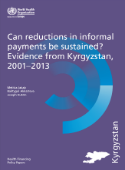Can reductions in informal payments be sustained? Evidence from Kyrgyzstan, 2001–2013 (2016)

Download
Kyrgyzstan demonstrated impressive results in reducing informal payments in its health system between 2001 and 2006, particularly for medicines, medical supplies and food. This was achieved by introducing reforms to reduce inefficiencies in the health system, by strengthening primary health care, restructuring the hospital network and channelling the savings to medicines and supplies.
Our results also show, however, that Kyrgyzstan could not sustain these gains in the longer run, as informal payments began to increase again after 2006, offsetting previous gains. This reversal was driven to a great extent by informal payments to medical personnel, despite a sizeable salary increase introduced in 2011, and to a lesser extent by informal payments for medicines and supplies.
The persistence of informal payments remains a problem because they continue to impose an unpredictable financial burden on patients and undermine the credibility of the State-guaranteed benefit package. There is no magic bullet for further reducing informal payments in the Kyrgyz health system. A comprehensive, multi-pronged approach that addresses the causes simultaneously could succeed if public funding is maintained at current levels.



